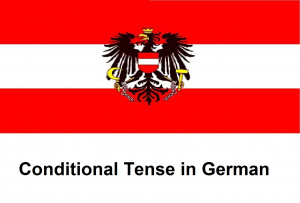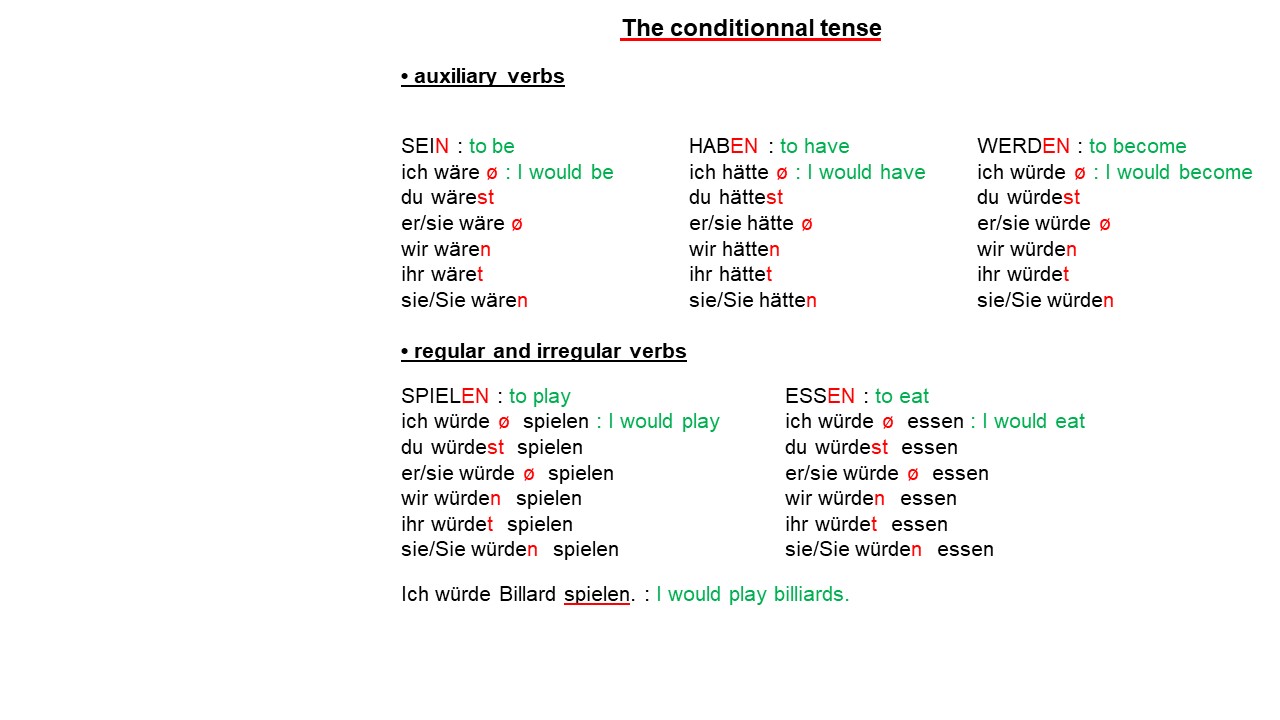Language/German/Grammar/Conditional-Mood
.
Hello everybody,
In today's lesson you will learn some useful vocabulary about ¨CONDITIONAL TENSE¨ in German
Feel free to edit this page by adding new words and expressions !
Good learning ! :)
.
.
.
Some Verbs in the Conditional Tense in German
Table with the finalizations in the Conditional Tense
.
| Pronouns in English | Conditional Tense | Pronouns in Brazilian Portuguese |
| I would ... | Pronoun + würde + verb in the infinitive | Eu + verbo no condicional |
| You would ... | Pronoun + würdest + verb in the infinitive | Você + verbo no condicional |
| He would ... | Pronoun + würde + verb in the infinitive | Ele + verbo no condicional |
| She would ... | Pronoun + würde + verb in the infinitive | Ela + verbo no condicional |
| We would ... | Pronoun + würden + verb in the infinitive | Nós + verbo no condicional |
| You would ... | Pronoun + würdet + verb in the infinitive | Vocês + verbo no condicional |
| They would ... | Pronoun + würden + verb in the infinitive | Eles + verbo no condicional |
| They would ... | Pronoun + würden + verb in the infinitive | Elas + verbo no condicional |
.
Verb : To work (arbeiten)
| Pronouns
English |
ENGLISH | PRONUNCIATION
ENGLISH |
GERMAN | PRONUNCIATION
BRAZILIAN PORTUGUESE |
Pronouns
Brazilian Portuguese |
BRAZILIAN
PORTUGUESE |
| I | would work | ih kh vewr deh
ahr bye tehn |
Ich würde
arbeiten |
iCH vyyr de
ar bái ten |
Eu | trabalharia |
| You | would work | dou vewr deh stih
ahr bye tehn |
Du würdest
arbeiten |
du vyyr des ti
ar bái ten |
Você | trabalharia |
| He | would work | ehr vewr deh
ahr bye tehn |
Er würde
arbeiten |
ér vyyr de
ar bái ten |
Ele | trabalharia |
| She | would work | zee vewr deh
ahr bye tehn |
sie würde
arbeiten |
zii vyyr de
ar bái ten |
Ela | trabalharia |
| We | would work | vee uhr vewr dehn
ahr bye tehn |
Wir würden
arbeiten |
víâr vyyr den
ar bái ten |
Nós | trabalharíamos |
| You | would work (plur) | ih uhr vewr deht
ahr bye tehn |
Ihr würdet
arbeiten |
íâr vyyr det
ar bái ten |
Vocês | trabalhariam |
| They | would work (masc) | zee vewr dehn
ahr bye tehn |
Sie würden
arbeiten |
zii vyyr den
ar bái ten |
Eles | trabalhariam |
| They | would work (fem) | zee vewr dehn
ahr bye tehn |
Sie würden
arbeiten |
zii vyyr den
ar bái ten |
Elas | Elas trabalham |
.
Verb : To buy (kaufen)
| Pronouns
English |
ENGLISH | PRONUNCIATION
ENGLISH |
GERMAN | PRONUNCIATION
BRAZILIAN PORTUGUESE |
Pronouns
Brazilian Portuguese |
BRAZILIAN
PORTUGUESE |
| I | would buy | ih kh vewr deh
cow fehn |
Ich würde
kaufen |
iCH vyyr de
káu fen |
Eu | compraria |
| You | would buy | dou vewr deh stih
cow fehn |
Du würdest
kaufen |
du vyyr des ti
káu fen |
Você | compraria |
| He | would buy | ehr vewr deh
cow fehn |
Er würde
kaufen |
ér vyyr de
káu fen |
Ele | compraria |
| She | would buy | zee vewr deh
cow fehn |
sie würde
kaufen |
zii vyyr de
káu fen |
Ela | compraria |
| We | would buy | vee uhr vewr dehn
cow fehn |
Wir würden
kaufen |
víâr vyyr den
káu fen |
Nós | compraríamos |
| You | would buy (plur) | ih uhr vewr deht
cow fehn |
Ihr würdet
kaufen |
íâr vyyr det
káu fen |
Vocês | comprariam |
| They | would buy (masc) | zee vewr dehn
cow fehn |
Sie würden
kaufen |
zii vyyr den
káu fen |
Eles | comprariam |
| They | would buy (fem) | zee vewr dehn
cow fehn |
Sie würden
kaufen |
zii vyyr den
káu fen |
Elas | comprariam |
.
Verb : To come (ankommen)
| Pronouns
English |
ENGLISH | PRONUNCIATION
ENGLISH |
GERMAN | PRONUNCIATION
BRAZILIAN PORTUGUESE |
Pronouns
Brazilian Portuguese |
BRAZILIAN
PORTUGUESE |
| I | would come | ih kh vewr deh
ahn koh mehn |
Ich würde ankommen | iCH vyyr de
an kó men |
Eu | viria |
| You | would come | dou vewr deh stih
ahn koh mehn |
Du würdest
ankommen |
du vyyr des ti
an kó men |
Você | viria |
| He | would come | ehr vewr deh
ahn koh mehn |
Er würde
ankommen |
ér vyyr de
an kó men |
Ele | viria |
| She | would come | zee vewr deh
ahn koh mehn |
sie würde
ankommen |
zii vyyr de
an kó men |
Ela | viria |
| We | would come | vee uhr vewr dehn
ahn koh mehn |
Wir würden
ankommen |
víâr vyyr den
an kó men |
Nós | viriamos |
| You | would come (plur) | ih uhr vewr deht
ahn koh mehn |
Ihr würdet
ankommen |
íâr vyyr det
an kó men |
Vocês | viriam |
| They | would come (mas) | zee vewr dehn
ahn koh mehn |
Sie würden
ankommen |
zii vyyr den
an kó men |
Eles | viriam |
| They | would come (fem) | zee vewr dehn
ahn koh mehn |
Sie würden
ankommen |
zii vyyr den
an kó men |
Elas | viriam |
.
Verb : To help (helfen)
| Pronouns
English |
ENGLISH | PRONUNCIATION
ENGLISH |
GERMAN | PRONUNCIATION
BRAZILIAN PORTUGUESE |
Pronouns
Brazilian Portuguese |
BRAZILIAN
PORTUGUESE |
| I | would help | ih kh vewr deh
hehl fehn |
Ich würde
helfen |
iCH vyyr de
HéL fen |
Eu | ajudaria |
| You | would help | dou vewr deh stih
hehl fehn |
Du würdest
helfen |
du vyyr des ti
HéL fen |
Você | ajudaria |
| He | would help | ehr vewr deh
hehl fehn |
Er würde
helfen |
ér vyyr de
HéL fen |
Ele | ajudaria |
| She | would help | zee vewr deh
hehl fehn |
sie würde
helfen |
zii vyyr de
HéL fen |
Ela | ajudaria |
| We | would help | vee uhr vewr dehn
hehl fehn |
Wir würden
helfen |
víâr vyyr den
HéL fen |
Nós | ajudariamos |
| You | would help (plur) | ih uhr vewr deht
hehl fehn |
Ihr würdet
helfen |
íâr vyyr det
HéL fen |
Vocês | ajudariam |
| They | would help (mas) | zee vewr dehn
hehl fehn |
Sie würden
helfen |
zii vyyr den
HéL fen |
Eles | ajudariam |
| They | would help (fem) | zee vewr dehn
hehl fehn |
Sie würden
helfen |
zii vyyr den
HéL fen |
Elas | ajudariam |
.
Verb : To let (lassen)
| Pronouns
English |
ENGLISH | PRONUNCIATION
ENGLISH |
GERMAN | PRONUNCIATION
BRAZILIAN PORTUGUESE |
Pronouns
Brazilian Portuguese |
BRAZILIAN
PORTUGUESE |
| I | would let | ih kh vewr deh
lah sehn |
Ich würde
lassen |
iCH vyyr de
lá sen |
Eu | deixaria |
| You | would let | dou vewr deh stih
lah sehn |
Du würdest
lassen |
du vyyr des ti
lá sen |
Você | deixaria |
| He | would let | ehr vewr deh
lah sehn |
Er würde
lassen |
ér vyyr de
lá sen |
Ele | deixaria |
| She | would let | zee vewr deh
lah sehn |
sie würde
lassen |
zii vyyr de
lá sen |
Ela | deixaria |
| We | would let | vee uhr vewr dehn
lah sehn |
Wir würden
lassen |
víâr vyyr den
lá sen |
Nós | deixariamos |
| You | would let (plur) | ih uhr vewr deht
lah sehn |
Ihr würdet
lassen |
íâr vyyr det
lá sen |
Vocês | deixariam |
| They | would let (mas) | zee vewr dehn
lah sehn |
Sie würden
lassen |
zii vyyr den
lá sen |
Eles | deixariam |
| They | would let (fem) | zee vewr dehn
lah sehn |
Sie würden
lassen |
zii vyyr den
lá sen |
Elas | deixariam |
Hi German learners!
In today's lesson we are going to learn about the Conditional Tense in the German language.
The conditional tense is called "Konjunktiv II (zwei)" in German.
It is used to talk about things that are pure hypothetical.
Note that there are two ways to form the conditional tense. The first one is a real verbal form, #the second one is perphrastic:
- "Ich sänge" is the real verbal form: I would sing.
- "Ich würde singen" is the periphrastic form.
There is no difference in meaning. But there can be a difference in style. The simple form belong often rather to formal speech. With some verbs though, the simple form ist quite common. You can see the most common simple forms her. The verbs "sein, werden und haben" have very common conditional forms. Notice that these forms can quite simply be derived from the past tenses of the verbs by adding umlauts: ich war becomes ich wäre and so forth.
With "spielen" and "essen", the table below shows the perphrastic form:
Conditional of "werden" plus infintive of the verb.
Notice the simple form, which can again be created by umlauting the past form. "ich spielte" becomes "ich spielte". There is just no umlaut for "ie"! This is a major problem of the simple form. If there is no legal way to umlaut the stem vowel, the form just doesn't change. With "essen" you have the past tense "ich aß". This allows an umlaut and will yield "ich äße". The form is theoretically correct and you can use is. But be warned: Unless you are Goethe or you are writing a formal essay, you will either get misunderstanding or laughter. The form is not really used. Instead, we say "Ich würde essen".
Things are never simple in German. In writing, a sentence this to many "würde" sounds clumsy. So use "würde" with care. As a rule of thumb, use the simple forms for "sein, haben, werden" and the periphrastic form for all the rest.
We are have a conditional form of the past. Take the compound past form and put the auxilliary in the conditional. "Ich habe gegessen" becomes "ich hätte gegessen", "Ich war gewesen" becomes "ich wäre gewesen". If you feel extremely confident about your German, try to figure out some passive forms: "ich bin gefragt worden" becomes "ich wäre gefragt worden" and so on.



